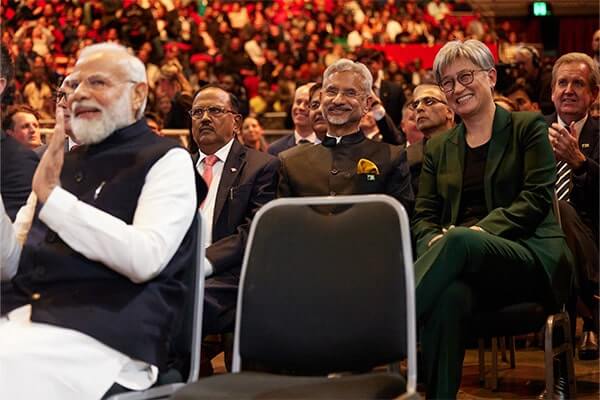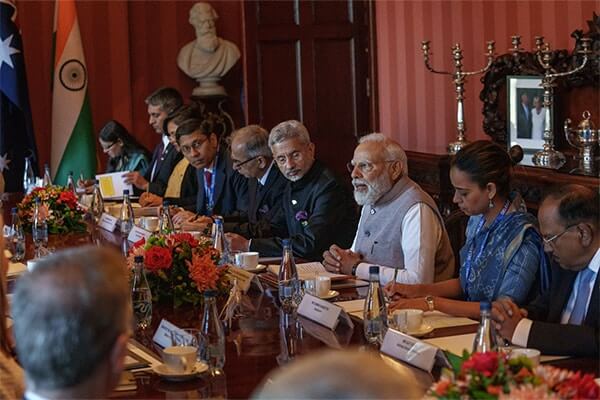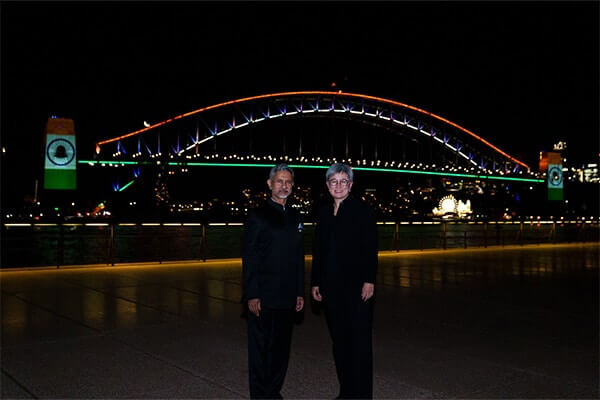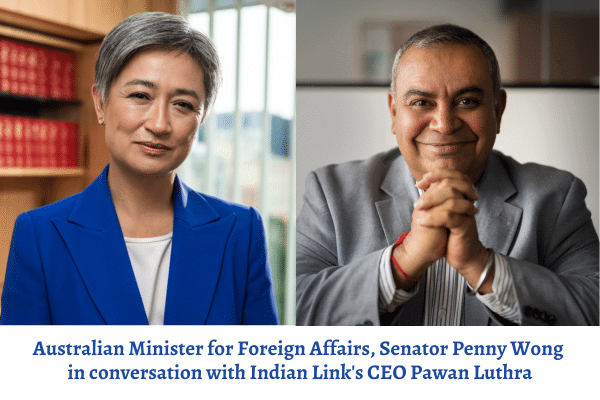Foreign Minister Penny Wong, thank you for joining us at Indian Link today. Namaste.
Great to be with you. Namaste.
You’ve met India’s External Affairs Minister Dr Jaishankar a few times. Picked up any Indian words other than Namaste?
Not very many I’m afraid! But I would say, I’ve met Jai or Dr Jaishankar many times since I became Foreign Minister and I always find our interactions enlightening. He’s a very reflective and thoughtful External Affairs Minister, and it’s been wonderful to get to know him.
The scenes at the Qudos Bank Arena last night were vibrant and energetic. What do you think attracts that sort of crowd and adulation for Prime Minister Modi?
Good question. It is in many ways unprecedented, isn’t it, to have a democratically elected leader have that kind of reception. We see some sort of similar reaction in some parts of the world, but last night, as you said, was vibrant and energetic. And one of the things the Prime Minister said which I thought was really insightful was, that three Ds define the relationship – democracy, diaspora and dosti. I think that exemplifies some of the depth of the relationship.
What do you think about his reference to the soft power part of the relationship, like MasterChef?
Well, it demonstrates, doesn’t it, that we’ve got such a broad relationship. Our relationship with India is about our interests. We share interests – very clear-eyed strategic interests about the sort of region we want, the sort of world we want. So that is central to our relationship. Our values are also central to how we envisage the relationship.
I think that the words of PM Modi where he talks about the diaspora, the Indian diaspora, as being both the bridge and the beating heart of the relationship was demonstrated last night. And so whether it’s MasterChef or cricket or family ties or educational ties, we are the full gamut. The full breadth of the relationship is wide and deep and growing, and that is a good thing for both countries.

Minister, I’ve been in Australia now for 37 years. I always felt that the relationship could be very strong, but we’ve only started accelerating in this area in the last seven to eight years, since 2014 when PM Modi first visited Australia. What has taken Australia so long to realise the similarities and potential in this relationship?
Well, you’re probably more well placed than I to do that, but whatever the reasons for that in the past, I’m really pleased as Foreign Minister that we see the momentum in the relationship now. As you know, Prime Minister Albanese visited in March, I visited, we’ve had a number of other ministers visit, a lot of bilateral visits, and now, of course, an historic visit by Mr Modi. So what that does say is we both recognise, at a time when there are a lot of challenges in our region and change in the world, that we both need partners. We both want to work together in the reshaping of our region to ensure it remains open and inclusive and stable and prosperous.
India is a global power, and it will become increasingly so. As you know, it’s the most populous nation on earth and it will continue to develop and it will continue to grow its security capacity. So I’ve no doubt that Australia-India relations are central to Australia’s national interests. And certainly as Foreign Minister I’m going to keep pressing for that.

Regarding the Centre for Australia-India Relations, Minister, what targets would you like for it to achieve in the next two or three years?
Swati Dave and Tim Thomas are the Chair and CEO respectively, and the Prime Minister and I have just appointed the board. Your question is a good one because I think that all of us have been to many meetings over the years where people talk about our relationship being underdone. People say we have a good strategic relationship, but the economic relationship is underdone. And what I have said to the Centre is I want some practical ways in which we can improve and deepen the economic relationship. In part that is the larger companies, but in part it is the strength of the diaspora, because, as you know, we have businesspeople in the diaspora who are building the economic relationship. I want to understand how we can as government facilitate more of that and how we can encourage more of those businesses to grow. Penny Wong Modi
You mean the entrepreneurial spirit in Indian-Australians to do business with both Australia and India?
That’s right. We’ve got a CEO forum later today that I’ve got the privilege of being in with Prime Minister Modi. I’m sure there’ll be a lot of discussion about opportunities there. And I do want some practical outcomes. I don’t want to have an interview with you in three years’ time in hopefully a second term of an Albanese Labor government where we’re having the same discussion about what we have to do in the economic relationship. I hope we can have an interview then where you say, ‘Minister, you actually did – we have actually shifted the dial on a few things.’

I would love to have a chat to see how things are progressing. Minister, changing tack a little, in many interviews you’ve given earlier today you’ve been asked how Australia would raise allegations of how India treats its minorities. You said, “We’ll do so respectfully.” But if India ignores these inputs respectfully, then in view of a larger relationship between the two countries, there’s not a lot Australia can do about that, is there?
Well, that proposition is the case in relation to every country. This is the nature of international relations – in relationships between nation states, on some issues there’s a lot of confluence and on other issues there’s difference. And part of what we have to do as we engage is to manage to find alignment and where interests and values are shared, but then where there are differences of views, how to manage that. It’s certainly not exclusive to India. I would again make the point, though, it is the world’s largest democracy and that is an extraordinary achievement. Penny Wong modi
Minister, at a press conference in Canberra last year you had looked surprised when I asked Dr Jaishankar about the resurgence of the Khalistan issue in the Sikh diaspora in Canada. His answer was blunt, and I’ll quote what he said: “I have myself engaged my counterpart on this issue and we have flagged the need to ensure that freedoms in a democratic society are not misused by forces which actually advocate violence and bigotry. So, it’s important I think for countries to understand today really how democracies should function not only at home, but also the responsibilities the democracies have to other democracies abroad.” The Khalistan issue is now playing out here in Australia. In the context of the above, has the Australian Government done enough to respect India’s wishes?
Look, I think we have been very clear that there is no space in Australia for hatred and bigotry. There is no space in Australia for violence. We value deeply – and treasure – our multiculturalism. Equally, we safeguard the social cohesion which enables that multiculturalism to thrive. And that is how we approach this and any other issue. The Prime Minister and other ministers, including I, unreservedly condemn the violence that we have seen in terms of the defacing of temples and so forth. You have seen, obviously, the appropriate responses by police. We’ll continue to ensure that these sorts of views which people may hold, in our society cannot be translated into violence and hate speech. We have a very clear view about it.

Before I let you go, Minister, Prime Minister Modi mentioned his favourite Indian eateries in Harris Park in his speech yesterday. Is a trip to Harris Park on your list when you visit next?
I’d love to. I’m from Adelaide and spend a lot of time in Canberra, so I haven’t actually spent time in sampling some of that cuisine. But I have someone who works for me who grew up in the area, and she’s promised me she’s going to take me to her favourite restaurants. I’ll let you know. Penny wong Modi
Senator Penny Wong, thank you for sharing your views.
It’s very good to speak with you again. Thank you.
READ ALSO: “What is it about Modi that attracts enormous crowds when he speaks?”





